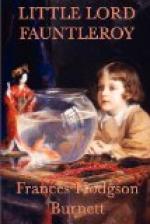“Seems like somethin’ orter be done,” said Mr. Hobbs. “Things like them orter be held on to—earls or no earls.”
But there really was nothing they could do but each write a letter to Cedric, containing assurances of their friendship and sympathy. They wrote those letters as soon as they could after receiving the news; and after having written them, they handed them over to each other to be read.
This is what Mr. Hobbs read in Dick’s letter:
“DERE frend: i got ure letter an Mr. Hobbs got his an we are sory u are down on ure luck an we say hold on as longs u kin an dont let no one git ahed of u. There is a lot of ole theves wil make al they kin of u ef u dont kepe ure i skined. But this is mosly to say that ive not forgot wot u did fur me an if there aint no better way cum over here an go in pardners with me. Biznes is fine an ile see no harm cums to u Enny big feler that trise to cum it over u wil hafter setle it fust with Perfessor Dick Tipton. So no more at present
“Dick.”
And this was what Dick read in Mr. Hobbs’s letter:
“Dear sir: Yrs received and wd say things looks bad. I believe its a put up job and them thats done it ought to be looked after sharp. And what I write to say is two things. Im going to look this thing up. Keep quiet and Ill see a lawyer and do all I can And if the worst happens and them earls is too many for us theres a partnership in the grocery business ready for you when yure old enough and a home and a friend in
“Yrs truly,
“Silas hobbs.”
“Well,” said Mr. Hobbs, “he’s pervided for between us, if he aint a earl.”
“So he is,” said Dick. “I’d ha’ stood by him. Blest if I didn’t like that little feller fust-rate.”
The very next morning, one of Dick’s customers was rather surprised. He was a young lawyer just beginning practice—as poor as a very young lawyer can possibly be, but a bright, energetic young fellow, with sharp wit and a good temper. He had a shabby office near Dick’s stand, and every morning Dick blacked his boots for him, and quite often they were not exactly water-tight, but he always had a friendly word or a joke for Dick.
That particular morning, when he put his foot on the rest, he had an illustrated paper in his hand—an enterprising paper, with pictures in it of conspicuous people and things. He had just finished looking it over, and when the last boot was polished, he handed it over to the boy.
“Here’s a paper for you, Dick,” he said; “you can look it over when you drop in at Delmonico’s for your breakfast. Picture of an English castle in it, and an English earl’s daughter-in-law. Fine young woman, too,—lots of hair,—though she seems to be raising rather a row. You ought to become familiar with the nobility and gentry, Dick. Begin on the Right Honorable the Earl of Dorincourt and Lady Fauntleroy. Hello! I say, what’s the matter?”




